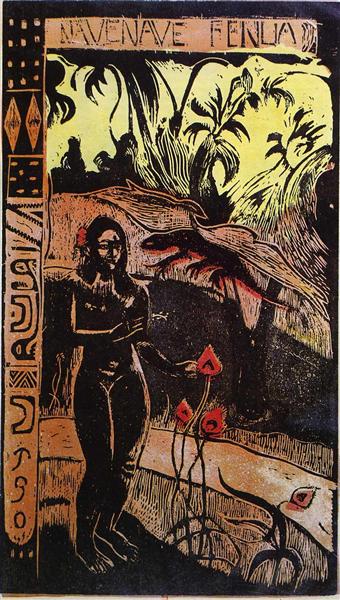Description
The painting "NOA Suite: Charming Earth" by Paul Gauguin, made in 1893, is a vibrant testimony of the artist's exploration in the use of color, shape and representation of Polynesian culture. Gauguin, who moved to Tahiti in search of a shelter from Western civilization and a deeper connection with the primitive and spiritual, approaches that are palpable in this work. When observing "lovely land", you can see Gauguin's skill to combine the elements of the landscape with its interpretation, creating a visual narrative that captures both the aesthetic structure and symbolism.
The canvas radiates with the vibrant tones of nature, where intense green and warm ocher predominate. Dense vegetation is mixed with the deep blue of the sky, offering a dream atmosphere that could be interpreted as an idealization of Tahitian life. Here, Gauguin is not limited to a literal reproduction of the landscape; Rather, it infuses an emotional expression through color, intentionally saturating the palette to cause feelings of joy and tranquility, while evoking a sense of the exotic and the unknown.
The composition of the work is organized around a climate of simplicity and harmony, where forms seem to flow naturally. Without human figures that compete with the environment, nature becomes the main character, allowing the viewer to immerse in the essence of what Gauguin considered a "delighted earth." This approach contrasts with its previous work in Europe, where the human figure had a predominant place. Here, the deliberate absence of characters can suggest a meditation on the place itself and its intrinsic meaning as a spiritual and artistic refuge.
A fascinating and less discussed aspect of "lovely land" is the way Gauguin used synthesis and symbolism in his work. Although the landscape may seem simple at first glance, there is an underlying complexity in the way in which the different shades of green and blue are combined. Through this mixture, Gauguin seeks not only to represent a place, but also evoke an emotional state that he experienced when he was in Tahiti. This is aligned with its artistic philosophy, in which I advocated the representation of emotions through color, a principle that anticipated later artistic movements such as Fauvism.
The creation of "NOA Suite: lovely land" is part of a crucial period in Gauguin's life, a time when he began to consolidate his unique style and his vision of art. Through this work, he invites us to reflect on the connection between the human being and nature, through a lens that is both personal and universal. The work is a reminder of the power of color and composition to transmit deep feelings, while reflecting the constant search of the artist to understand and represent the essence of a world that he considered pure and primary.
"Suite Noa Noa: lovely land" is, therefore, not only a beautiful landscape, but also a fragment of the complex relationship that Gauguin cultivated with his environment, a visual manifesto of his struggle to rediscover humanity in nature. The work resonates strongly in the context of its time and, although it can be seen through the lens of symbolism and post -impressionism, it also offers us a window to the deepest aspirations of art: to capture the ephemeral beauty and the essence of the human experience.
KUADROS ©, a famous paint on your wall.
Hand-made oil painting reproductions, with the quality of professional artists and the distinctive seal of KUADROS ©.
Reproduction service paintings With a guarantee of satisfaction. If you are not completely satisfied with the replica of your painting, we refund your money 100%.

